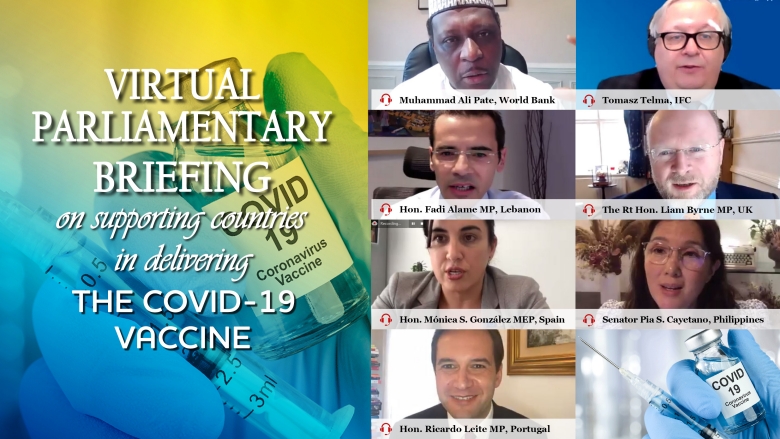February 17, 2021 - The World Bank Group and the Parliamentary Network on the World Bank and IMF (PN) co-organized a Virtual Parliamentary Briefing on Supporting Countries in Delivering the COVID-19 Vaccine on February 17, 2021. The gathering engaged legislators in a roundtable-style discussion on best practices and evidence-based policies to support inclusive and transparent immunization campaigns in their countries.
More than 150 legislators from around the world, as well as representatives from parliamentary organizations, connected to hear about how the World Bank Group is helping low- and middle-income countries assess and remedy challenges to deploying vaccines and treatments fairly, efficiently and safely. The discussion also promoted knowledge-sharing among participants representing a diverse range of countries and regions from the European Parliament, Lebanon, the Philippines, Portugal, and the UK.
COVID-19 continues to take a heavy toll on populations around the world, threatening to push an additional 150 million people into extreme poverty by the end of 2021. While vaccines provide a light at the end of the pandemic tunnel, they illuminate glaring inequalities between and within nations in terms of wealth to buy vaccines, health systems to administer them, and infrastructure to store and transport them. They also bring up issues of transparency in distribution and misinformation. Parliamentarians are fundamental to ensuring the efficient and equitable distribution of COVID-19 vaccines through policies, oversight, and clear communications with their constituencies. The Virtual Parliamentary Briefing on Supporting Countries in Delivering the COVID-19 Vaccine served as an opportunity to share best practices and knowledge to support parliamentarians in these efforts.
During his address, Muhammad Ali Pate, Global Director for Health, Nutrition, and Population at the World Bank emphasized the critical role that legislators play in immunization strategies. The World Bank has committed $12 billion to support developing countries to purchase and distribute vaccines, tests and treatments and strengthen national vaccination systems. While national governments continue to roll out support programs in response to the pandemic, the spread of disinformation is causing setbacks in vaccine uptake. By embedding transparency in policies and oversight, parliamentarians can rebuild trust in the political system to strengthen the response to ongoing and future emergencies.
“Transparency is essential to earn the trust of people. Without it, vaccination campaigns will not be successful. We need trust at all levels to overcome this pandemic and get on a path to recovery.” - Muhammad Ali Pate, Global Director for Health, Nutrition, and Population at the World Bank
Tomasz Telma, Global Director of Manufacturing, Agriculture and Services at the International Finance Corporation (IFC) called for parliamentarians to address the gaps brought to light by the pandemic to strengthen health systems. He described how IFC’s Global Health Platform is making $4 billion available to increase the local production and supply of essential medical equipment and other supplies, health services, and drug treatments and vaccines in emerging markets. Through the mobilization of resources and political will, the recovery could serve as an opportunity to push forward ambitious reforms to ensure that the post-COVID-19 world is more equitable and resilient to future shocks.
“The pandemic has revealed many gaps in the health supply chains around the world. Let’s use this as an opportunity to develop diagnostics, treatments and responses to [better manage] future pandemics.” – Tomasz Telma, Global Director of Manufacturing, Agriculture and Services (IFC)
During a lively discussion moderated by the Rt. Hon. Liam Byrne MP, UK and Chair of the PN, Members of Parliament provided diverse perspectives on the measures taken by their national legislatures and what’s needed to tackle the crisis. Priority topics included global cooperation in the equitable distribution of vaccines to ensure that no one is left behind and building trust nationally by stopping the spread of misinformation.
“If vaccines are to be considered a global public good, low- and middle-income countries need to have fair access to them.” – Hon. Mónica Silvana Gonzalez, Member of the European Parliament
Participants called for high-income countries and the private sector alike to collaborate more towards the fair distribution of vaccines worldwide. Part of this endeavor includes enforcing transparency in public procurement to stem corruption in the allocation of excess vaccines. To tackle vaccine hesitancy, participants suggested communications and information campaigns that debunk misconceptions while acknowledging the contextual histories that have led to a surge in skepticism. To continue and expand the inter-parliamentary dialogue, the PN and UNITE Global Parliamentary Network to End Infectious Diseases announced a global health working group to share lessons-learned to encourage and enable an agenda of inclusive and effective policies for the post-pandemic world.
“Unless we secure health for all and, most importantly, those most vulnerable, we will all be vulnerable” – Ricardo Baptista Leite MD, MP, Portugal; Vice-Chair of the PN, and Founder of UNITE
Key takeaways:
- The PN and UNITE will create a working group dedicated to global health with a repository of parliamentary lessons learned.
- Parliamentarians are essential in upholding transparency, which is key to delivering vaccines and building public trust in institutions to combat vaccine hesitancy.
- Accessing vaccines is not just about the financial resources to buy them, it is also about having the raw materials and supplies, logistics and infrastructure to manufacture and deploy them.
- The COVID-19 pandemic has revealed many gaps. This is an opportunity to be proactive and fill those gaps by developing diagnostics, treatment, technology transfer and improving international cooperation to address future responses.
- Multilateral organizations such as the World Bank Group play an important role in preserving and disseminating best practices.

